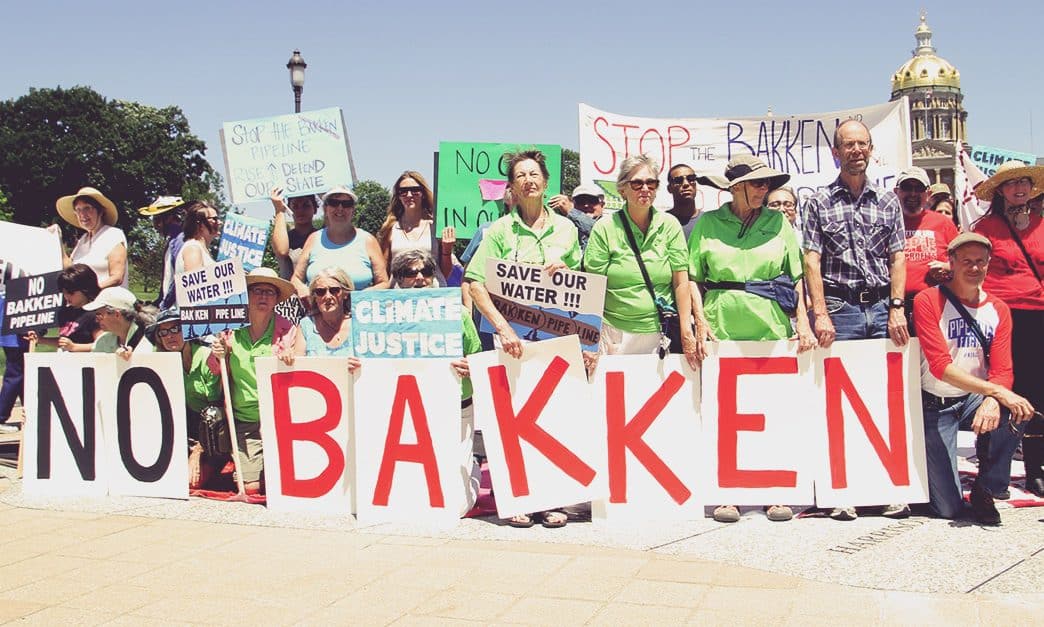By Cameron Sheridan, CLDC Law Clerk
SF 2235, An Act Relating to Criminal Acts Committed On or Against Critical Infrastructure and Providing Penalties: A chilling of protestor freedom in Iowa.
This bill has passed both houses of the Iowa Legislature and is pending Gubernatorial approval. The original version of the bill passed the Senate and was sent to the House, where it was expanded and reintroduced for Senate approval. The Senate ultimately voted to pass the bill 35-13.
The bill defines and proposes criminal penalties for critical infrastructure sabotage. Proponents of the bill argue that it is necessary to protect the interests of Iowans and to “protect our citizens and protect our infrastructure” in the words of the bill’s manager Rep. Gary Worthan, R-Storm Lake.
The bill’s passage through the senate was contentious and drew much critique from Democratic senators. Sen. Robert Hogg, D-Cedar Rapids, said the bill represented “extraordinarily overbreadth.” The source of this critique was the provision in the bill criminalizes any acts made with intent “to cause and having the means to cause… a substantial and widespread interruption or impairment of a fundamental service rendered by the critical infrastructure.”[1] The charge under the bill would be for a class B felony, punishable with up to 25 years in prison or a fine up to $100,000.
There is a significant fear that this bill is specifically designed to target protestors, as the bill does not define what a “substantial and widespread interruption or impairment” entails. Additionally, the vast majority of lobbyists in support of the bill represent oil or gas pipeline companies or others in the energy industries.[2] The list of lobbyists includes pipeline construction firms such as Energy Transfer Partners a pipeline company who worked to build the Dakota Access Pipeline. As many commenters have noted, hundreds of Iowans were involved in protests against, and intending to delay the completion of, the Dakota Access Pipeline, and many were arrested while protesting.
Ed Fallon, a former state legislator who now works with Bold Iowa, an activist group considers the proposed legislation to be an attempt to silence future dissent against pipelines. He stated that “hundreds of pipeline protest[ers] who were peaceful, nonviolent, and didn’t engage in property destruction could be accused of interrupting service under this bill and subject [sic] to insane consequences.”
This concern has been reflected by legislators as well, Rep. Rick Olson, D-Des Moines called the bill overreach and said, of his fellow representatives, “I know that there will be some of you in both parties who feel compelled to vote for this because, if you don’t, you’re afraid you’ll get a card that says you’re soft on crime. No, what this is, is soft on our ability to have free speech.” Rep. Olson offered an amendment to specifically protect demonstrators, picketers, and protesters, however this was voted down 42-56 in the state House.
Legislators supporting the bill have claimed that it would be necessary to protect against ransomware attacks, terrorist attacks, and a perceived “high level of crime”. However, commenters and legislators have pointed out that Iowa already has laws in place protect against cyber-attacks, terror attacks, and destruction of physical property. Sen. Hogg, who also attempted to include a limiting amendment that was voted down, put the concern succinctly, “Don’t turn every protester into a class B felon. This is an extraordinary chilling bill to people’s freedom.”
Executive Director and Attorney Lauren Regan said, “Many climate defenders engage in civil disobedience or direct action knowing that their acts may already be punished as crimes. The only reason to legislate enhanced criminal penalties in this manner is to gratuitously broadcast the collusion between the industry and lawmakers who receive money from these industries and their lobbyists. This is purely a gift to the industry in an attempt to deter climate defense activists who have growing public support in this country—particularly within the scientific community. The industry is losing ground and is desperately lashing out with sham lawsuits, repugnant surveillance of political organizing, and increased criminalization of dissent. This desperate attempt will fail to turn the tide of this growing movement.” Know your rights.
The bill was sent to Governor Kim Reynolds for her approval or veto on April 3, 2018.
Governor Reynolds’s office can be reached at 515-281-5211 or via mail at 1007 East Grand Ave. Des Moines, Iowa 50319.
[1] IA Legis. S., SF 2235, Reg. Sess. 2017-2019 (2018)
[2] IA Legis. Gen. Assemb. 87, SF 2235, Lobbyist Declarations (2018) (e.g. Alliance Pipeline, Inc., Maquoketa Valley Electric Cooperative, NextEra Energy, Black Hills Energy, Iowa Propane Gas Assn., American Petroleum Institute, Energy Transfer, etc.)

